Key takeaways:
- Effective lobbying involves building relationships and humanizing causes through personal stories and data.
- Consistency in advocacy is crucial for keeping issues like homelessness on policymakers’ agendas, fostering long-term dialogue and cooperation.
- Empathy, adaptability, and persistence are essential traits for advocates to inspire change and overcome barriers in homelessness advocacy.
- Coalition-building and clear communication significantly enhance the impact of lobbying efforts, especially when timed strategically with policy discussions.

Understanding effective lobbying
Effective lobbying is about more than just influencing policy; it’s about building relationships. I recall when I first approached a local legislator about homelessness issues. My heart raced as I shared personal stories from those impacted by lack of affordable housing. That connection made a difference, reinforcing how important it is to humanize the cause.
I have come to realize that successful lobbying requires clear communication of your goals and challenges. For instance, when advocating for increased funding for shelters, I found it helpful to present data alongside personal testimonies. Isn’t it compelling when facts are intertwined with real-life struggles? That combination can sway even the most skeptical decision-makers, as it illustrates the immediate need for action.
Moreover, timing and persistence play crucial roles in effective lobbying. I learned that bringing up an issue consistently, while keeping the conversation alive, helps keep it on the radar of policymakers. Have you ever brought up a topic so frequently that it began to resonate? It’s that kind of dedication and approach that can turn the tide and inspire change.
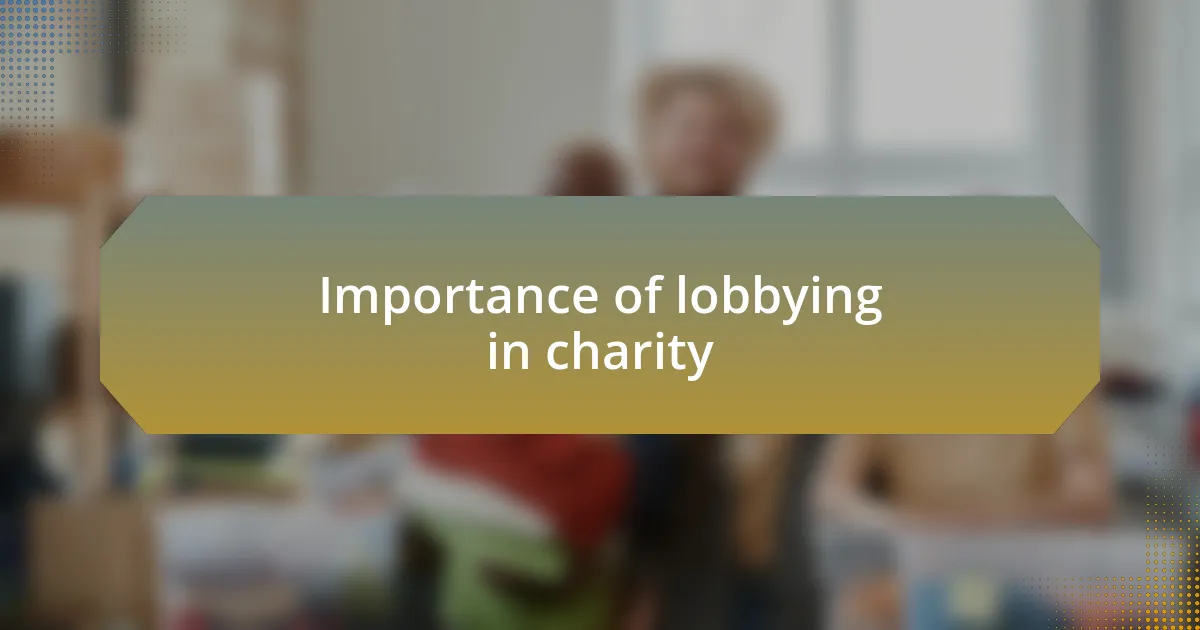
Importance of lobbying in charity
Lobbying is crucial for charities as it serves to elevate the voices of those they represent, particularly vulnerable populations like the homeless. I vividly remember attending a city council meeting where advocates passionately discussed the dire need for more shelter spaces. It struck me how those testimonies stirred emotions, urging council members to reconsider their stances. Isn’t it remarkable how sharing individual stories can translate into tangible policy changes?
Moreover, successful lobbying can foster long-term relationships between charities and policymakers, creating a collaborative environment for change. For instance, I once organized a roundtable discussion with local leaders, which opened channels for ongoing dialogue. Those casual conversations led to a deeper understanding of the complexities of homelessness, reinforcing the importance of consistent engagement in advocacy efforts.
When charities lobby effectively, they don’t just push for immediate results; they help to set the stage for lasting reforms. I have seen firsthand how continuous advocacy keeps issues like homelessness in the public eye, prompting reforms that benefit the community as a whole. Have you ever noticed how persistent messaging can shape public perception? That sustained effort can turn entire communities into allies in the fight against homelessness.
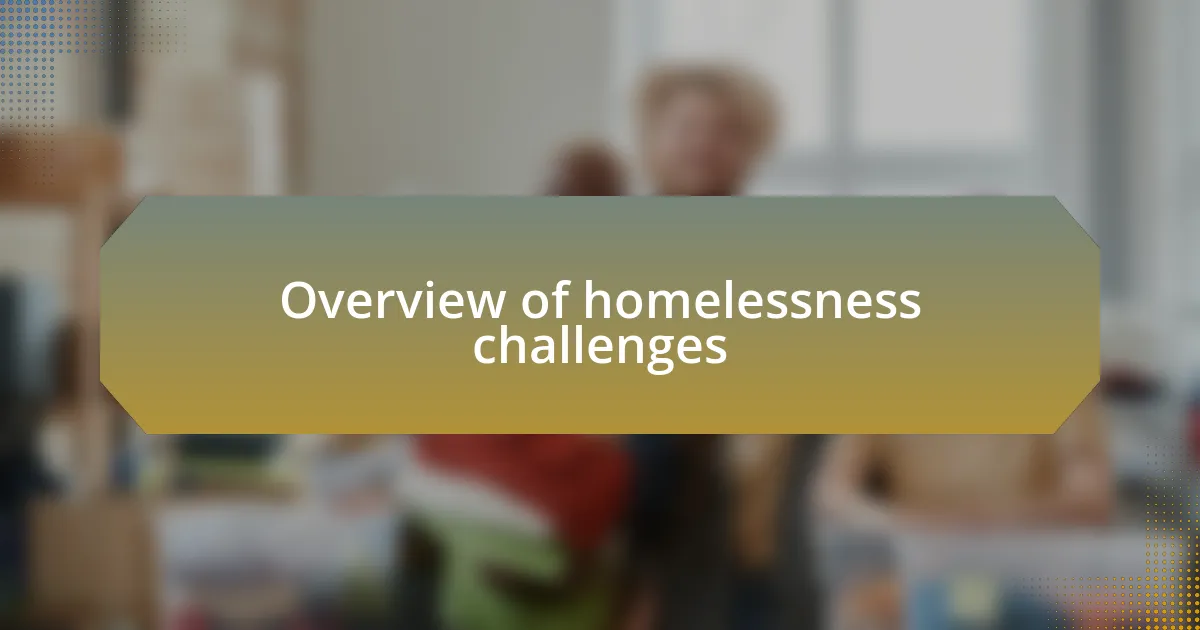
Overview of homelessness challenges
Addressing homelessness presents a multitude of challenges that often get overlooked. From inadequate shelter options to limited access to mental health services, the barriers are significant. I recall speaking with a woman living in her car who described how the lack of safe, reliable places to rest compounded her struggles, making it clear just how critical stable housing is for recovery and stability.
Financial constraints also compound these issues. Many programs and resources that could help those experiencing homelessness face consistent budget shortfalls. In one instance, I visited a community center that had to shut its doors early each day due to insufficient funding, leaving vulnerable individuals with nowhere to go. It made me wonder how many more lives could be positively impacted with just a little more support.
Additionally, the stigmas surrounding homelessness further hinder effective solutions. Just last month, I attended a community workshop where participants revealed their misconceptions about those experiencing homelessness. Engaging in these discussions highlighted how educating the public can break down barriers and foster empathy. Isn’t it essential to challenge these perceptions to create a more supportive atmosphere for everyone?
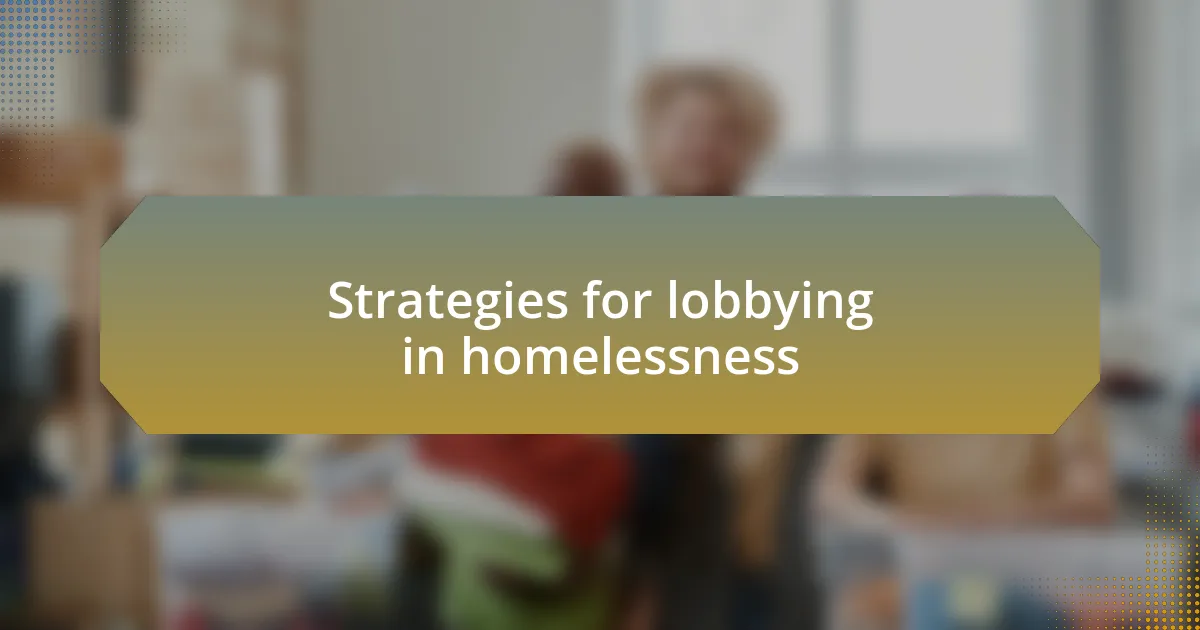
Strategies for lobbying in homelessness
Effective lobbying in the realm of homelessness requires a multi-faceted approach. I’ve found that building strong coalitions with local organizations amplifies our voice. For instance, I participated in a rally where various charities united to advocate for increased funding for mental health services. This collective effort not only heightened visibility but also fostered a sense of shared purpose among attendees.
Another strategy involves directly engaging with policymakers. I once had coffee with a local representative who was genuinely surprised by the statistics I presented about our community’s homeless population. Personal stories can sometimes make the statistics resonate more deeply. By sharing real-life experiences, like how a former homeless individual successfully transitioned back into stable housing, I believe we can shift perspectives and encourage meaningful policy changes.
It’s equally important to utilize social media to raise awareness. When I started a campaign to highlight personal narratives of those affected by homelessness, the response was overwhelming. It was a powerful reminder of just how engaged people can become when they see faces alongside the issues. Isn’t it fascinating how a tweet or a post can spark conversations that lead to real advocacy?
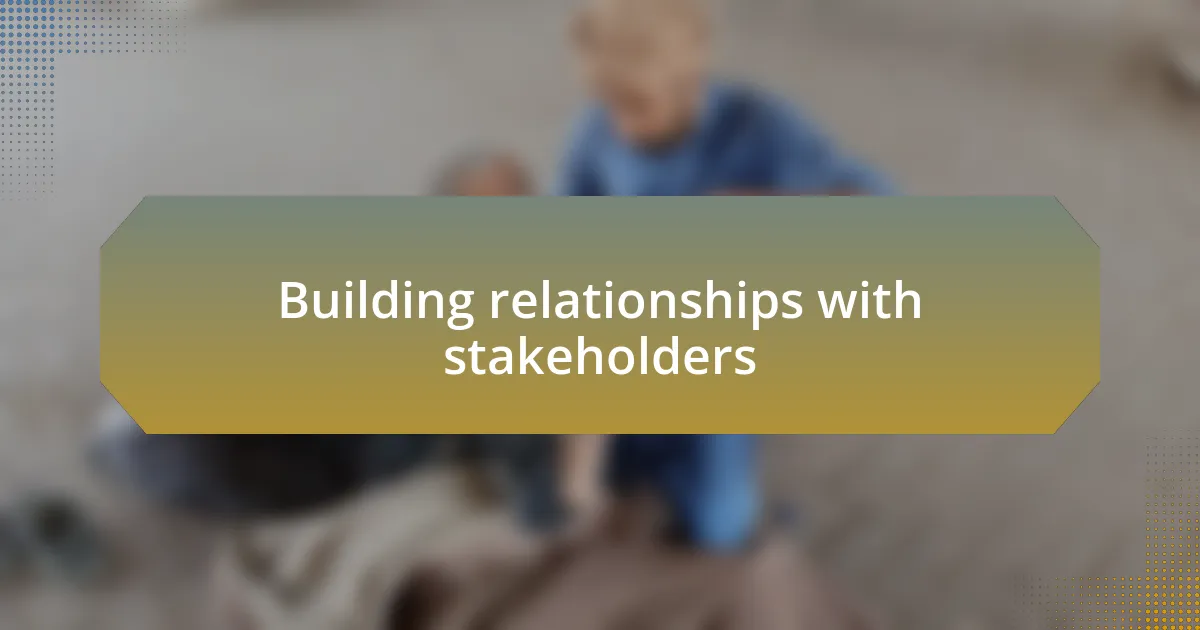
Building relationships with stakeholders
Building relationships with stakeholders is crucial for effective lobbying in the homelessness sector. In my experience, attending community meetings where local business owners and advocates gather has proven invaluable. I remember one meeting where I listened to a small business owner share how a lack of affordable housing directly impacted his ability to hire staff. That moment made me realize how interconnected our mission is with the interests of local entrepreneurs; we all share the goal of a thriving community.
Creating these connections is about more than just exchanging information—it’s about establishing trust and mutual respect. During a panel discussion I participated in, a city council member opened up about his own family’s struggles with housing insecurity decades ago. This vulnerability encouraged a deeper dialogue, allowing us to craft solutions together. Doesn’t it make you think about how shared experiences can bridge gaps between different sectors?
Once, I reached out to a local non-profit leader who I thought might be hesitant to collaborate, given our different focuses. To my surprise, she welcomed the idea. We ended up co-hosting an event that brought together various stakeholders to discuss innovative housing solutions. It taught me that sometimes, taking the initiative to connect can lead to surprising partnerships that benefit everyone involved.
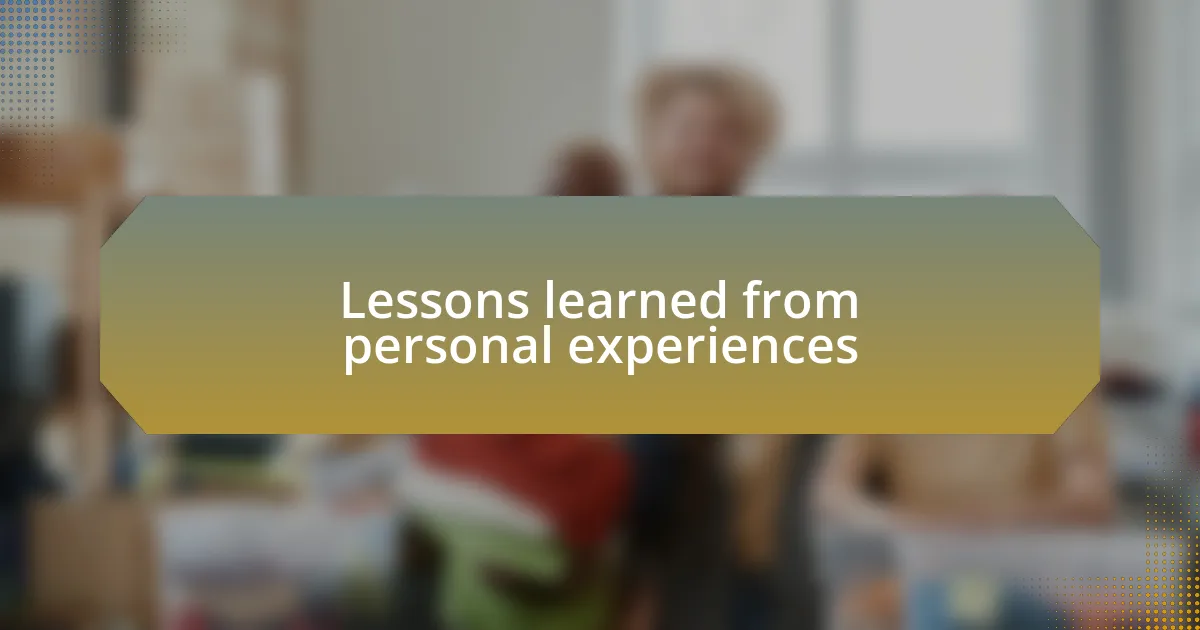
Lessons learned from personal experiences
One of the most profound lessons I’ve learned is the power of empathy in advocacy. I recall attending a city hall meeting where a former resident shared her story of losing her home. Hearing her speak about the emotional toll of homelessness made it clear to me that facts and figures, while important, don’t capture the raw human experience behind the issue. How can we expect to drive change if we’re not deeply moved by the stories of those we aim to help?
In my journey, I’ve also discovered the importance of being adaptable. I once prepared extensively for a meeting with a state senator, only to find out that the focus had shifted unexpectedly towards budget cuts. I had to think on my feet, drawing on personal experiences to illustrate the potential impact of funding decisions on our community. That experience solidified my belief that being flexible in our approach can often open doors we didn’t even know existed.
Lastly, I’ve realized that persistence is key. After months of trying to get a response from a local policymaker, I decided to attend one of their public events. I engaged them casually, mentioning the data from past conversations while sharing a brief success story about someone we had helped. The personal touch finally broke the ice. This taught me that following up with a human element can often reinvigorate stalled conversations and inspire action when least expected.
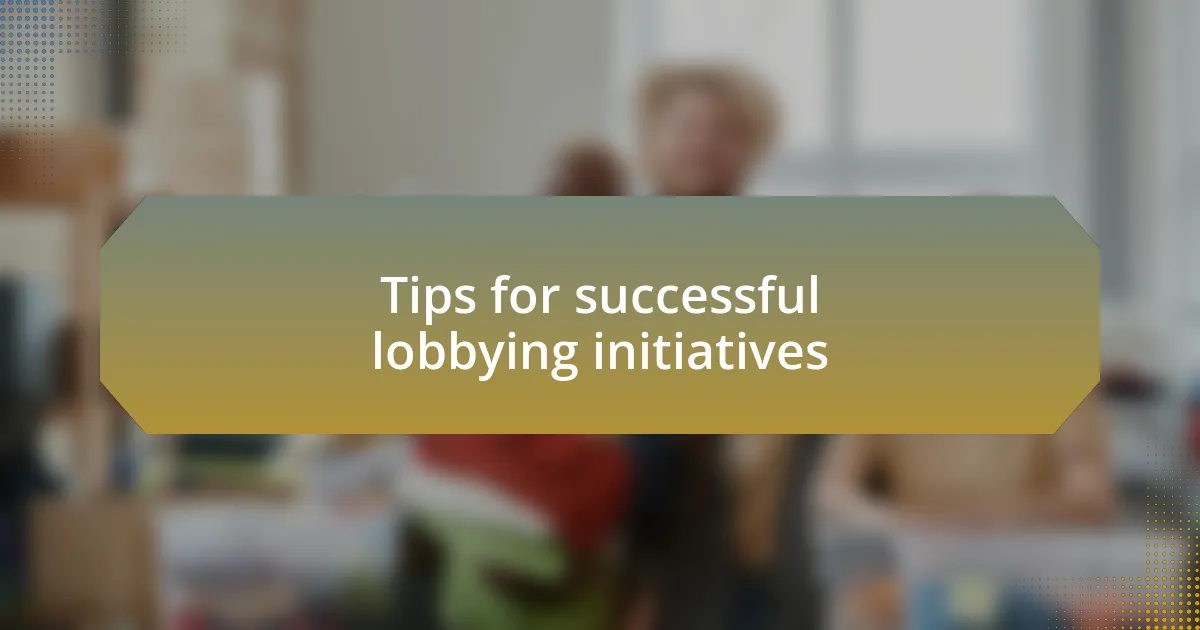
Tips for successful lobbying initiatives
To ensure successful lobbying initiatives, it’s crucial to build coalitions with like-minded organizations. I remember collaborating with several local nonprofits for a campaign aimed at increasing funding for homelessness services. By pooling resources and messaging, we amplified our voices, making it harder for policymakers to ignore our collective demand. Have you ever considered how much more impactful a united front can be compared to a solitary effort?
It’s also essential to communicate clearly and compellingly. During a strategic meeting with a key decision-maker, I focused on sharing concise and relatable stories rather than drowning them in statistics. I could see their eyes light up when I recounted a young woman’s journey from homelessness to stability, illustrating the real-life impact of legislative support. Isn’t it fascinating how a well-told narrative can resonate on a deeper level than mere numbers?
Finally, timing is everything. I’ve discovered that sending a well-timed email or scheduling a meeting right before budget discussions can greatly increase the chances of your voice being heard. At one pivotal moment, I reached out to a legislator just as they were drafting a new housing bill. That proactive approach led to my input being integrated into the final proposal. It made me realize that being strategic with timing can turn advocacy into opportunity.